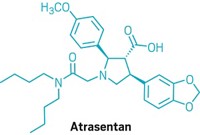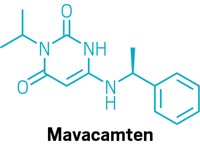Advertisement
Grab your lab coat. Let's get started
Welcome!
Welcome!
Create an account below to get 6 C&EN articles per month, receive newsletters and more - all free.
It seems this is your first time logging in online. Please enter the following information to continue.
As an ACS member you automatically get access to this site. All we need is few more details to create your reading experience.
Not you? Sign in with a different account.
Not you? Sign in with a different account.
ERROR 1
ERROR 1
ERROR 2
ERROR 2
ERROR 2
ERROR 2
ERROR 2
Password and Confirm password must match.
If you have an ACS member number, please enter it here so we can link this account to your membership. (optional)
ERROR 2
ACS values your privacy. By submitting your information, you are gaining access to C&EN and subscribing to our weekly newsletter. We use the information you provide to make your reading experience better, and we will never sell your data to third party members.
Biologics
FDA approves first-in-class drug for rare lung disorder
Merck & Co.’s sotatercept is designed to treat pulmonary arterial hypertension
by Rowan Walrath
March 27, 2024

The US Food and Drug Administration has approved a fusion protein made by Merck & Co. for a rare, life-threatening lung disorder.
The drug, called sotatercept and set to be marketed under the name Winrevair, is designed to treat pulmonary arterial hypertension (PAH) by trapping ligands of the transforming growth factor-β superfamily of proteins. It’s a new approach to treating PAH, wherein small arteries in the lung thicken and narrow, blocking blood flow. Over time, it becomes more difficult for blood to get through the lungs, forcing the heart to work harder and eventually wear out.
People with PAH have so far relied on classic vasodilators, but 21% of these people with the disorder die within 3 years of initiating treatment—a number that goes up to 55% for those considered high risk (J. Am. Heart Assoc. 2022, DOI: 10.1161/JAHA.121.024969).
“The progression slows down a little bit, but [the vasodilators] don’t treat the underlying root cause,” says Joerg Koglin, senior vice president of clinical development at Merck, where he oversees cardiovascular and other therapeutic divisions. “Despite us now having many of those patients on two or three of those vasodilators, the mortality hasn’t really changed.”
In a 323-person Phase 3 clinical trial, sotatercept bested a placebo when it came to exercise capacity, pulmonary vascular resistance, and overall function and survival. At 33 weeks, nearly five times as many study participants in the placebo group died or had their symptoms worsen than in the sotatercept group (N. Engl. J. Med. 2023, DOI: 10.1056/NEJMoa2213558).

Somewhere between 15 and 50 people per million in the US and Europe have PAH, making it a rare disorder (Respir. Med. 2020, DOI: 10.1016/j.rmed.2020.106099), but analysts expect high demand given the unmet clinical need. Leerink Partners’ Daina M. Graybosch wrote in a research note Monday that the drug’s approval would “unleash strong demand, with the US sales ramp gated by the practical logistics of rolling out the therapy.”
The drug comes in a refrigerated vial that holds either 45 mg or 60 mg. It needs to be drawn down into a needle and injected just underneath the skin under the guidance of a physician. Some of the most common adverse events in trials were hemoglobin increases, which occurred in about 15% of recipients, and bleeding, which occurred in about 4%.
Sotatercept was at the heart of Merck’s $11.5 billion acquisition of Cambridge-based Acceleron Pharma, which initially developed the drug, in 2021. Early preclinical data, Koglin remembers, were “nothing short of stunning.” And he knows what it’s like to treat PAH patients. Koglin practiced as a cardiologist in the 1990s, before PAH had any approved medications.
“When you see those individual patients, you have maybe a 40- or 50-year-old woman sitting in front of you, saying, ‘Hey, a couple months ago, I started getting short of breath when exercising. I think maybe it’s nothing, but can we look at it?’ And you have to give them a diagnosis that will ultimately limit their life expectancy,” Koglin says. “That makes you, by definition, a patient advocate.”





Join the conversation
Contact the reporter
Submit a Letter to the Editor for publication
Engage with us on Twitter